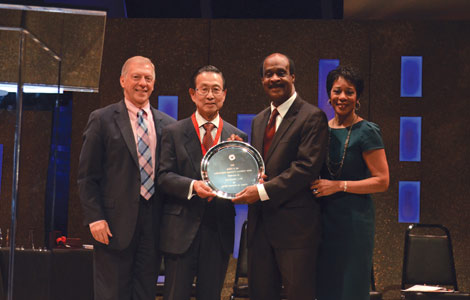Adapt to changing demographics or pay the price: expert
Updated: 2014-04-30 10:39
By San Francisco Journal/ Chen Jia (China Daily USA)
|
||||||||
California Governor Jerry Brown said that although his state doesn't have the power of the US government, that won't stop him from forging ties with China.
"People may ask, 'How can a little state like California affect policy with a big old country like China?' " Brown said. "Well, California is a nation-state, and with so little going on in Washington, it gives us space to do things here in California."
Brown made his remarks in an address at the Common Ground Conference in San Francisco that was put on by the Committee of 100 (C-100) at its 23rd annual meeting over the weekend. The international non-profit organization of Chinese-American leaders is dedicated to strengthening ties between the US and China.
Brown said the Asian population continues to grow in the state. Between 1990 and 2010, the Asian population in the Bay Area grew by more than 600,000 to make up nearly a quarter of the population. In San Francisco, that number is even higher, with Asians making up 33 percent of the city's residents in 2010, according to US census data.
In Los Angeles, the racial makeup of Los Angeles included 426,959 Asians in 2010, accounting for 11 percent of the city's residents, according to US census data.
Since Chinese people make a sizable presence among the Asian population in California, they are helping to build a closer relationship in trade and investment between China and the state.
"The Governor knows well that it is in California's economic interest to seek closer cooperation with China and not count on the Federal government to propose any sensible policy that would move the US forward," George Koo, a member of C-100, told China Daily on Tuesday.
"He is rightly proud that the state is not suffering from gridlock and is working to move forward," he said.
He also said Brown's remarks were "by no means an indulgence in hyperbole".
California's economy is about the 7th or 8th largest in the world, if considered as a stand-alone nation, certainly larger than such countries as Italy and Spain, he said.
David M. Lampton, director of China studies at Johns Hopkins School of Advanced International Studies and author of the new book Following the Leader, said Brown's comments point to a critical aspect of the American system — that is federalism.
American states have their own rights of initiative, not only in domestic policy, but also in foreign, particularly foreign economic policy, he said.
US states compete with each other in attracting talent, investment and trade relationships, as well as expressing the interests and views of their populations on the more diplomatic aspects of foreign policy, he said.
"Governor Brown colorfully is giving expression to the current popular exasperation with Washington's gridlock by pointing out that states do not need to entirely depend on Washington to improve their own circumstances — they can seek their own initiative, not only domestically, but abroad as well," Lampton said.
This capacity of US state-level governments and private firms to act independently is not unlimited, but there is wide latitude, he said.
"At a time when Beijing-Washington ties have seen better days, perhaps revitalizing and strengthening state-province relations is an important avenue along which to move," he said.
"Governor Brown, for instance, seized the initiative to meet with President Xi Jinping in connection with Xi's visit to California and Sunnylands last year," he said.
I believe Governor Brown meant that the ethnic profile, not to mention economic orientation, of California (and the United States) is changing in very important ways, Lampton said.
People of Latin American and Asian heritage and ethnicity are growing as a proportion of the total population, he said.
"With these demographic changes political realities, economic orientation and opportunities are shifting southward and westward — importantly in the direction of China," he said.
The implication is that if politicians want to survive, and businesses want to prosper, they need to adapt to the new opportunities that these demographic and economic shifts represent, Lampton said.
"Adapt to be successful dealing with Asia, and use the important human resources this demographic shift provides — or lose!"
Contact the writer at chenjia@chinadailyusa.com.

 Trees provide surface for 3D images
Trees provide surface for 3D images
 Climbing skyscraper in Kiev with no safety equipment
Climbing skyscraper in Kiev with no safety equipment
 London tube strike gets under way
London tube strike gets under way
 Fast-pacing piglets in S China
Fast-pacing piglets in S China
 Top 10 amazing places in Beijing for night-view
Top 10 amazing places in Beijing for night-view
 Service honored
Service honored
 You can't change your mind now
You can't change your mind now
 BYD unveils first electric commuter bus in California
BYD unveils first electric commuter bus in California
Most Viewed
Editor's Picks

|

|

|

|

|

|
Today's Top News
Forum trends: Chinese foods you must not miss
Obama's Asia trip fails to achieve goals, experts say
US sanctions raise concerns
Xi calls for anti-terror tools
High score: Xbox One to hit China
Geffen interested in buying Clippers
Russia's FM scolds West for imposing sanctions
Putin declines tit-for-tat sanctions against West
US Weekly

|

|








